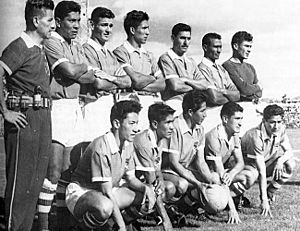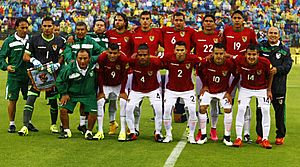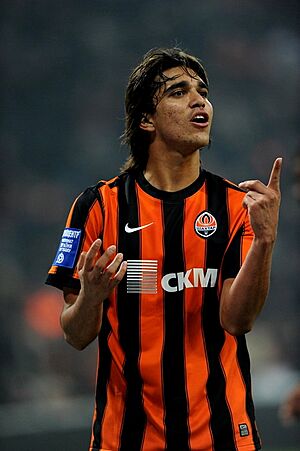Bolivia national football team facts for kids
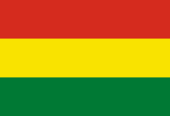 |
|||||||||||
| Nickname(s) | La Verde (The Green) | ||||||||||
|---|---|---|---|---|---|---|---|---|---|---|---|
| Association | Federación Boliviana de Fútbol (FBF) | ||||||||||
| Confederation | CONMEBOL (South America) | ||||||||||
| Head coach | Óscar Villegas | ||||||||||
| Captain | Luis Haquín | ||||||||||
| Most caps | Marcelo Moreno (108) | ||||||||||
| Top scorer | Marcelo Moreno (31) | ||||||||||
| Home stadium | Estadio Municipal de El Alto | ||||||||||
| FIFA code | BOL | ||||||||||
|
|||||||||||
| FIFA ranking | |||||||||||
| Current | 60 |
||||||||||
| Highest | 18 (July 1997) | ||||||||||
| Lowest | 115 (October 2011) | ||||||||||
| Elo ranking | |||||||||||
| Current | 49 |
||||||||||
| Highest | 22 (June 1997) | ||||||||||
| Lowest | 86 (July 1989) | ||||||||||
| First international | |||||||||||
(Santiago, Chile; 12 October 1926) |
|||||||||||
| Biggest win | |||||||||||
(La Paz, Bolivia; 22 August 1993) (La Paz, Bolivia; 3 March 2000) |
|||||||||||
| Biggest defeat | |||||||||||
(Lima, Peru; 6 November 1927) (São Paulo, Brazil; 10 April 1949) |
|||||||||||
| World Cup | |||||||||||
| Appearances | 3 (first in 1930) | ||||||||||
| Best result | Group stage (1930, 1950, 1994) | ||||||||||
| Copa América | |||||||||||
| Appearances | 29 (first in 1926) | ||||||||||
| Best result | Champions (1963) | ||||||||||
| Confederations Cup | |||||||||||
| Appearances | 1 (first in 1999) | ||||||||||
| Best result | Group stage (1999) | ||||||||||
|
Medal record
|
|||||||||||
The Bolivia national football team, also known as La Verde (The Green), represents Bolivia in international men's football games. The team is managed by the Federación Boliviana de Fútbol (Bolivian Football Federation). It is one of ten teams in FIFA's South American Football Confederation (CONMEBOL).
Bolivia has played in the World Cup three times. They participated in 1930 and 1950. Their last appearance was in 1994. In all World Cups, they did not get past the first round. They have only scored one goal in a World Cup, which happened in 1994.
Despite their World Cup record, Bolivia has done well in the Copa América. They won the tournament at home in 1963. They also finished second in 1997, which they also hosted. In the 2015 Copa América, they reached the quarter-finals. This was their best result since 1997. They beat Ecuador 3–2 in that tournament. This win also ended a long streak without a victory in the Copa América. Their previous win was in 1997 against Mexico.
Contents
Team History
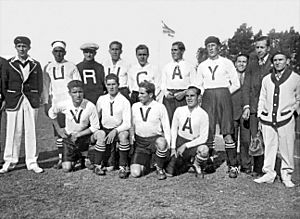
Bolivia played its first international football match in 1926. This was one year after the Bolivian Football Federation was created. They joined FIFA in the same year. Bolivia played in the 1926 South American Championship in Chile. Their first game was against the host team, Chile, on October 12, 1926. Bolivia scored first but lost 7–1. They also lost their next three matches. These were against Argentina, Paraguay, and Uruguay.
In 1930, Bolivia was invited to the first World Cup in Uruguay. Bolivia was in Group 2. They lost both their games 4–0. They played against Yugoslavia and Brazil. The game against Yugoslavia was their last against a non-South American team until 1972.
Bolivia returned for the 1950 FIFA World Cup. They got a spot automatically because Argentina pulled out of the qualifiers. Bolivia was in a group with Uruguay. Their only game was an 8–0 loss to Uruguay.
Bolivia's biggest football success was winning the 1963 South American Championship. They hosted the tournament and finished first among seven countries. They were undefeated with five wins and one draw. Their only draw was 4–4 against Ecuador. Playing at high altitudes helped them. In the next tournament in 1967, Bolivia finished last. This was a big disappointment for their fans.
Later, football in Bolivia improved. The Academia Tahuichi Aguilera football school opened in 1978. It helped develop talented players like Marco Etcheverry, Erwin Sánchez, and Luis Cristaldo.
Under Spanish coach Xabier Azkargorta, Bolivia made history. They became the first team to beat Brazil in the 1994 World Cup qualifiers. They won 2–0 in La Paz. Nine players from the Tahuichi school were on the team. Bolivia qualified for the 1994 FIFA World Cup by finishing second in their group. They had big wins, including 7–0 and 7–1 against Venezuela.
In the 1994 World Cup, Bolivia was in Group C. They played against defending champions Germany. Bolivia lost 1–0 after one of their players, Marco Etcheverry, was sent off. They then drew 0–0 with South Korea. In their last game, they lost 3–1 to Spain. Sánchez scored Bolivia's first World Cup goal in that match.
After the World Cup, Bolivia played in the 1995 Copa América. They reached the quarter-finals for the first time since 1963. They lost 2–1 to Uruguay. In 1997, Bolivia hosted the Copa América again. They reached the final but lost 3–1 to Brazil.
Because they were runners-up in the 1997 Copa América, Bolivia played in the 1999 FIFA Confederations Cup. They were in Group A with Mexico, Saudi Arabia, and Egypt. They drew 2–2 with Egypt and 0–0 with Saudi Arabia. They lost 1–0 to Mexico and were eliminated.
In the 2015 Copa América in Chile, Bolivia was in Group A. They drew 0–0 with Mexico. They then beat Ecuador 3–2. This win helped them reach the quarter-finals. It was their first time in the quarter-finals since 1997. Bolivia lost 3–1 to Peru in the quarter-finals. Marcelo Moreno scored their only goal from a penalty. In the next three Copa América tournaments, Bolivia lost all their games.
In 2021, the new president of the Bolivian Football Federation, Fernando Costa Sarmiento, promised to improve football in Bolivia. He wanted to make it more professional. On March 28, 2023, Bolivia won an away game against a World Cup team. They beat Saudi Arabia 2–1 in a friendly match.
Home Stadiums
Bolivia used to play home matches at Estadio Hernando Siles. This stadium is very high up, at 3,637 meters (11,932 feet) above sea level. Many visiting teams complained that this altitude gave Bolivia an unfair advantage. FIFA, the world football body, first tried to ban games at such high altitudes. However, after many complaints, they changed the rules. They made an exception for La Paz. In 2008, FIFA removed the altitude limit completely.
In 2024, the Bolivian Football Federation decided to change their home stadium. They now play home games at Estadio Municipal de El Alto. This stadium is even higher, at 4,150 meters (13,615 feet) above sea level. The coach said they would play where the players live.
Team Look
Kit History
Bolivia's first uniforms were all white. In the 1930 FIFA World Cup, they wrote "Viva Uruguay" on their jerseys to please the local fans. In a game against Brazil, they borrowed Uruguay's blue uniform because Brazil also wore white. In 1945, they wrote "Viva Chile" on their jerseys for the hosts.
In 1946, Bolivia changed their jerseys to black and white stripes. These were the colors of the Cochabamba region. The next year, they went back to white. In 1957, the Federation decided to use the colors of the Flag of Bolivia. Since many other South American teams used red and yellow, green became the main color. This is how they got their nickname, "La Verde" (The Green).
Kit Sponsors
| Kit supplier | Period |
|---|---|
| 1977–1979 | |
| 1980–1982 | |
| 1983–1986 | |
| 1987–1988 | |
| 1989-1990 | |
| 1991–1992 | |
| 1993–1999 | |
| 2000–2005 | |
| 2006–2010 | |
| 2011–2014 | |
| 2015–? | |
| ?-present |
Recent Games
Here are the results of Bolivia's matches in the last year. Also, any future games that are planned.
Win Draw Loss Fixture
2024 Matches
| 5 September 2026 FIFA World Cup qualification | Bolivia |
4–0 | El Alto, Bolivia | |
| 16:00 UTC−4 |
|
Stadium: Estadio Municipal de El Alto Attendance: 20,500 Referee: Wilmar Roldán (Colombia) |
| 10 September 2026 FIFA World Cup qualification | Chile |
1–2 | Santiago, Chile | |
| 18:00 UTC−3 |
|
Stadium: Estadio Nacional Julio Martínez Prádanos Attendance: 40,000 Referee: Juan Benítez (Paraguay) |
| 10 October 2026 FIFA World Cup qualification | Bolivia |
1–0 | El Alto, Bolivia | |
| 16:00 UTC−4 | Stadium: Estadio Municipal de El Alto Attendance: 17,191 Referee: Wilton Sampaio (Brazil) |
| 15 October 2026 FIFA World Cup qualification | Argentina |
6–0 | Buenos Aires, Argentina | |
| 21:00 UTC−3 |
|
Stadium: Estadio Monumental Attendance: 60,000 Referee: Kevin Ortega (Peru) |
| 14 November 2026 FIFA World Cup qualification | Ecuador |
4–0 | Guayaquil, Ecuador | |
| 19:00 UTC−5 | Stadium: Estadio Monumental Isidro Romero Carbo Attendance: 30,758 Referee: Maximiliano Ramírez (Argentina) |
| 19 November 2026 FIFA World Cup qualification | Bolivia |
2–2 | El Alto, Bolivia | |
| 16:00 UTC−4 |
|
Stadium: Estadio Municipal de El Alto Attendance: 18,655 Referee: Andrés Matonte (Uruguay) |
2025 Matches
| 20 March 2026 FIFA World Cup qualification | Peru |
3–1 | Lima, Peru | |
| 20:30 UTC−5 |
|
Stadium: Estadio Nacional Referee: Yael Falcón Pérez (Argentina) |
| 25 March 2026 FIFA World Cup qualification | Bolivia |
0–0 | El Alto, Bolivia | |
| 16:00 UTC−4 | Stadium: Estadio Municipal de El Alto Attendance: 10,723 Referee: Augusto Aragón (Ecuador) |
| 6 June 2026 FIFA World Cup qualification | Venezuela |
2–0 | Maturín, Venezuela | |
| 18:00 UTC−4 | Stadium: Estadio Monumental Attendance: 46,741 Referee: Yael Falcón Pérez (Argentina) |
| 10 June 2026 FIFA World Cup qualification | Bolivia |
2–0 | El Alto, Bolivia | |
| 16:00 UTC−4 | Stadium: Estadio Municipal de El Alto Attendance: 11,467 Referee: Esteban Ostojich (Uruguay) |
| 4 September 2026 FIFA World Cup qualification | Colombia |
v | Barranquilla, Colombia | |
| 18:30 UTC−5 | Stadium: Estadio Metropolitano Roberto Meléndez |
| 9 September 2026 FIFA World Cup qualification | Bolivia |
v | El Alto, Bolivia | |
| 19:30 UTC−4 | Stadium: Estadio Municipal de El Alto |
Coaching Staff
Coaching History
- Caretaker managers are listed in italics.
 Jose de la Cerda (1926)
Jose de la Cerda (1926) Jorge Valderrama (1927–1929)
Jorge Valderrama (1927–1929) Ulises Saucedo (1930–1937)
Ulises Saucedo (1930–1937) Julio Borelli (1938–1945)
Julio Borelli (1938–1945) Diógenes Lara (1945–1947)
Diógenes Lara (1945–1947) Félix Deheza (1948–1950)
Félix Deheza (1948–1950) Mario Pretto (1950–1952)
Mario Pretto (1950–1952) César Viccino (1953–1958)
César Viccino (1953–1958) Vicente Arraya (1959)
Vicente Arraya (1959) Danilo Alvim (1960–1965)
Danilo Alvim (1960–1965) Dan Georgiadis (1966–1967)
Dan Georgiadis (1966–1967) Rudi Gutendorf (1974)
Rudi Gutendorf (1974) Ramiro Blacut (1979–1981)
Ramiro Blacut (1979–1981) Raúl Pino (1985)
Raúl Pino (1985) Ramiro Blacut (1985–1987)
Ramiro Blacut (1985–1987) Jorge Habegger (1988–1990)
Jorge Habegger (1988–1990) Ramiro Blacut (1991–1992)
Ramiro Blacut (1991–1992) Xabier Azkargorta (1993–1994)
Xabier Azkargorta (1993–1994) Antonio López Habas (1995–1997)
Antonio López Habas (1995–1997) Dušan Drašković (1997–1998)
Dušan Drašković (1997–1998) Héctor Veira (1998–2000)
Héctor Veira (1998–2000) Carlos Aragonés (2000–2001)
Carlos Aragonés (2000–2001) Jorge Habegger (2001)
Jorge Habegger (2001)
 Carlos Trucco (2001–2002)
Carlos Trucco (2001–2002) Dalcio Giovagnoli (2003)
Dalcio Giovagnoli (2003)
 Nelson Acosta (2003–2004)
Nelson Acosta (2003–2004) Ramiro Blacut (2004-2005)
Ramiro Blacut (2004-2005) Ovidio Messa (2005)
Ovidio Messa (2005) Erwin Sánchez (2006–2009)
Erwin Sánchez (2006–2009) Eduardo Villegas (2009)
Eduardo Villegas (2009)
 Gustavo Quinteros (2010–2012)
Gustavo Quinteros (2010–2012) Xabier Azkargorta (2012–2014)
Xabier Azkargorta (2012–2014) Mauricio Soria (2014)
Mauricio Soria (2014) Néstor Clausen (2014)
Néstor Clausen (2014) Mauricio Soria (2015)
Mauricio Soria (2015) Julio César Baldivieso (2015–2016)
Julio César Baldivieso (2015–2016) Ángel Guillermo Hoyos (2016)
Ángel Guillermo Hoyos (2016) Mauricio Soria (2016–2018)
Mauricio Soria (2016–2018) César Farías (2018)
César Farías (2018) Daniel Farías (2018)
Daniel Farías (2018) Eduardo Villegas (2019)
Eduardo Villegas (2019) César Farías (2019–2022)
César Farías (2019–2022)
 Pablo Escobar (2022)
Pablo Escobar (2022) Gustavo Costas (2022–2023)
Gustavo Costas (2022–2023) Antônio Carlos Zago (2023–2024)
Antônio Carlos Zago (2023–2024) Óscar Villegas (2024–present)
Óscar Villegas (2024–present)
Team Players
Current Squad
These players were chosen for the 2026 FIFA World Cup qualification games. These matches were against Venezuela and Chile in June 2025.
Caps and goals are updated as of June 10, 2025, after the game against Chile.
| No. | Pos. | Player | Date of birth (age) | Caps | Goals | Club |
|---|---|---|---|---|---|---|
| 1 | GK | Carlos Lampe (vice-captain) | 17 March 1987 | 58 | 0 | |
| 12 | GK | Rodrigo Banegas | 8 November 1995 | 0 | 0 | |
| 23 | GK | Guillermo Viscarra | 7 February 1993 | 32 | 0 | |
|
|
||||||
| 2 | DF | Diego Arroyo | 29 April 2005 | 2 | 0 | |
| 3 | DF | Diego Medina | 13 January 2002 | 24 | 0 | |
| 5 | DF | Efrain Morales | 4 March 2004 | 6 | 0 | |
| 17 | DF | Roberto Fernández | 12 July 1999 | 45 | 1 | |
| 20 | DF | Yomar Rocha | 21 June 2003 | 9 | 0 | |
| 21 | DF | José Sagredo | 10 March 1994 | 64 | 1 | |
| 22 | DF | Leonardo Zabala | 23 May 2002 | 2 | 0 | |
| DF | Lucas Macazaga | 16 August 2006 | 0 | 0 | ||
|
|
||||||
| 4 | MF | Óscar López | 13 August 2006 | 1 | 0 | |
| 6 | MF | Héctor Cuéllar | 16 August 2000 | 19 | 0 | |
| 7 | MF | Miguel Terceros | 25 April 2004 | 24 | 7 | |
| 8 | MF | Moisés Villarroel | 7 September 1998 | 28 | 1 | |
| 14 | MF | Robson Tomé | 18 May 2002 | 11 | 0 | |
| 15 | MF | Gabriel Villamíl | 28 June 2001 | 29 | 0 | |
| 16 | MF | Ervin Vaca | 18 March 2004 | 5 | 1 | |
|
|
||||||
| 9 | FW | Enzo Monteiro | 27 May 2004 | 6 | 2 | |
| 10 | FW | Gabriel Sotomayor | 2 July 1999 | 1 | 0 | |
| 13 | FW | Moisés Paniagua | 16 August 2007 | 3 | 0 | |
| 11 | FW | Carmelo Algarañaz | 27 January 1996 | 35 | 4 | |
| 18 | FW | Lucas Chávez | 17 April 2003 | 13 | 0 | |
| 19 | FW | Jhon Velásquez | 22 April 2003 | 1 | 0 | |
| FW | Gary Rea | 30 June 2003 | 0 | 0 | ||
Recent Call-ups
These players have also been called up to the team in the last year.
| Pos. | Player | Date of birth (age) | Caps | Goals | Club | Latest call-up |
|---|---|---|---|---|---|---|
| GK | Braulio Uraezaña | 26 March 1995 | 0 | 0 | v. |
|
| GK | Alejandro Torres | 19 March 1998 | 0 | 0 | v. |
|
| GK | Bruno Poveda | 22 October 2003 | 0 | 0 | v. |
|
|
|
||||||
| DF | Luis Haquín (captain) | 15 November 1997 | 45 | 1 | v. |
|
| DF | Luis Paz | 9 June 2004 | 4 | 0 | v. |
|
| DF | Marcelo Torrez | 8 July 2006 | 0 | 0 | v. |
|
| DF | Marcelo Suárez | 29 August 2001 | 15 | 0 | v. |
|
| DF | Sebastián Álvarez | 29 August 2001 | 1 | 0 | v. |
|
| DF | René Barboza | 2 April 1993 | 0 | 0 | v. |
|
| DF | Widen Saucedo | 1 March 1997 | 0 | 0 | v. |
|
| DF | Pablo Vaca | 31 May 2002 | 1 | 0 | v. |
|
|
|
||||||
| MF | Ramiro Vaca | 1 July 1999 | 43 | 5 | v. |
|
| MF | Boris Céspedes | 19 June 1995 | 19 | 1 | v. |
|
| MF | Adalid Terrazas | 25 August 2000 | 5 | 0 | v. |
|
| MF | Carlos Sejas | 10 January 2004 | 1 | 0 | v. |
|
| MF | Gustavo Mendoza | 11 May 2004 | 0 | 0 | v. |
|
| MF | Jeyson Chura | 3 February 2002 | 9 | 0 | v. |
|
| MF | Daniel Camacho | 15 October 1998 | 1 | 0 | v. |
|
| MF | Víctor Cuéllar | 23 September 2000 | 1 | 0 | v. |
|
| MF | Gabriel Montaño | 23 June 1999 | 0 | 0 | Suspended | v. |
| MF | Henry Vaca | 27 January 1998 | 21 | 1 | v. |
|
|
|
||||||
| FW | Víctor Ábrego | 11 February 1997 | 17 | 2 | v. |
|
| FW | Roler Ferrufino | 10 October 2000 | 0 | 0 | v. |
|
| FW | César Menacho | 9 August 1999 | 6 | 0 | v. |
|
| FW | José Martínez | 18 September 2002 | 1 | 0 | v. |
|
| FW | Bruno Miranda | 10 February 1998 | 21 | 3 | v. |
|
|
COV Withdrew from the squad due to COVID-19. |
||||||
Player Records
- Players in bold are still active with Bolivia.
Most Games Played
| Rank | Player | Caps | Goals | Career |
|---|---|---|---|---|
| 1 | Marcelo Moreno | 108 | 31 | 2007–2023 |
| 2 | Ronald Raldes | 102 | 3 | 2001–2018 |
| 3 | Luis Cristaldo | 93 | 5 | 1989–2005 |
| Marco Sandy | 93 | 6 | 1993–2003 | |
| 5 | José Milton Melgar | 89 | 6 | 1980–1997 |
| 6 | Juan Carlos Arce | 88 | 15 | 2004–2022 |
| Carlos Borja | 88 | 1 | 1979–1995 | |
| 8 | Julio César Baldivieso | 85 | 15 | 1991–2005 |
| Juan Manuel Peña | 85 | 1 | 1991–2009 | |
| 10 | Miguel Rimba | 80 | 0 | 1989–2000 |
Most Goals Scored
| Rank | Player | Goals | Caps | Ratio | Career |
|---|---|---|---|---|---|
| 1 | Marcelo Moreno | 31 | 108 | 0.29 | 2007–2023 |
| 2 | Joaquín Botero | 20 | 48 | 0.42 | 1999–2009 |
| 3 | Victor Ugarte | 16 | 45 | 0.36 | 1947–1963 |
| 4 | Carlos Aragonés | 15 | 31 | 0.48 | 1977–1981 |
| Erwin Sánchez | 15 | 57 | 0.26 | 1989–2005 | |
| Julio César Baldivieso | 15 | 85 | 0.18 | 1991–2005 | |
| Juan Carlos Arce | 15 | 88 | 0.17 | 2004–2022 | |
| 8 | Máximo Alcócer | 13 | 22 | 0.59 | 1953–1963 |
| Marco Etcheverry | 13 | 71 | 0.18 | 1989–2003 | |
| 10 | Miguel Aguilar | 10 | 34 | 0.29 | 1977–1983 |
Tournament Records
FIFA World Cup
| FIFA World Cup record | Qualification record | ||||||||||||||||
|---|---|---|---|---|---|---|---|---|---|---|---|---|---|---|---|---|---|
| Year | Round | Position | Pld | W | D | L | GF | GA | Squad | Pld | W | D | L | GF | GA | ||
| Group stage | 12th | 2 | 0 | 0 | 2 | 0 | 8 | Squad | Qualified as invitees | ||||||||
| Did not enter | Declined participation | ||||||||||||||||
| Group stage | 13th | 1 | 0 | 0 | 1 | 0 | 8 | Squad | Qualified automatically | ||||||||
| Did not enter | Declined participation | ||||||||||||||||
| Did not qualify | 4 | 2 | 0 | 2 | 6 | 6 | |||||||||||
| 2 | 0 | 1 | 1 | 2 | 3 | ||||||||||||
| 4 | 1 | 0 | 3 | 4 | 9 | ||||||||||||
| 4 | 2 | 0 | 2 | 5 | 6 | ||||||||||||
| 4 | 0 | 0 | 4 | 1 | 11 | ||||||||||||
| 8 | 3 | 1 | 4 | 10 | 25 | ||||||||||||
| 4 | 1 | 0 | 3 | 5 | 6 | ||||||||||||
| 4 | 0 | 2 | 2 | 2 | 7 | ||||||||||||
| 4 | 3 | 0 | 1 | 6 | 5 | ||||||||||||
| Group stage | 21st | 3 | 0 | 1 | 2 | 1 | 4 | Squad | 8 | 5 | 1 | 2 | 22 | 11 | |||
| Did not qualify | 16 | 4 | 5 | 7 | 18 | 21 | |||||||||||
| 18 | 4 | 6 | 8 | 21 | 33 | ||||||||||||
| 18 | 4 | 2 | 12 | 20 | 37 | ||||||||||||
| 18 | 4 | 3 | 11 | 22 | 36 | ||||||||||||
| 16 | 2 | 6 | 8 | 17 | 30 | ||||||||||||
| 18 | 4 | 2 | 12 | 16 | 38 | ||||||||||||
| 18 | 4 | 3 | 11 | 23 | 42 | ||||||||||||
| Qualification in progress | 16 | 5 | 2 | 9 | 16 | 32 | |||||||||||
| To be determined | To be determined | ||||||||||||||||
| Total | Group stage | 3/22 | 6 | 0 | 1 | 5 | 1 | 20 | — | 184 | 48 | 34 | 102 | 216 | 358 | ||
| FIFA World Cup record | |||
|---|---|---|---|
| Year | Round | Score | Result |
| 1930 | Group stage | Loss | |
| Group stage | Loss | ||
| 1950 | First round | Loss | |
| 1994 | Group stage | Loss | |
| Group stage | Draw | ||
| Group stage | Loss | ||
Copa América
Champions Runners-up Third place Fourth place
| South American Championship / Copa América record | |||||||||
|---|---|---|---|---|---|---|---|---|---|
| Year | Round | Position | Pld | W | D | L | GF | GA | Squad |
| No national representative | |||||||||
| Not a CONMEBOL member | |||||||||
| Fifth place | 5th | 4 | 0 | 0 | 4 | 2 | 24 | Squad | |
| Fourth place | 4th | 3 | 0 | 0 | 3 | 3 | 19 | Squad | |
| Did not participate | |||||||||
| Sixth place | 6th | 6 | 0 | 2 | 4 | 3 | 16 | Squad | |
| Sixth place | 6th | 5 | 0 | 0 | 5 | 4 | 23 | Squad | |
| Seventh place | 7th | 7 | 0 | 2 | 5 | 6 | 21 | Squad | |
| Fourth place | 4th | 7 | 4 | 0 | 3 | 13 | 24 | Squad | |
| Sixth place | 6th | 6 | 1 | 1 | 4 | 6 | 15 | Squad | |
| Did not participate | |||||||||
| Seventh place | 7th | 6 | 0 | 1 | 5 | 4 | 23 | Squad | |
| Withdrew | |||||||||
| Champions | 1st | 6 | 5 | 1 | 0 | 19 | 13 | Squad | |
| Sixth place | 6th | 5 | 0 | 1 | 4 | 0 | 9 | Squad | |
| 1975 | Group stage | 8th | 4 | 1 | 0 | 3 | 3 | 9 | Squad |
| 1979 | 6th | 4 | 2 | 0 | 2 | 4 | 7 | Squad | |
| 1983 | 8th | 4 | 0 | 2 | 2 | 4 | 6 | Squad | |
| 7th | 2 | 0 | 1 | 1 | 0 | 2 | Squad | ||
| 9th | 4 | 0 | 2 | 2 | 0 | 8 | Squad | ||
| 9th | 4 | 0 | 2 | 2 | 2 | 7 | Squad | ||
| 10th | 3 | 0 | 2 | 1 | 1 | 2 | Squad | ||
| Quarter-finals | 8th | 4 | 1 | 1 | 2 | 5 | 6 | Squad | |
| Runners-up | 2nd | 6 | 5 | 0 | 1 | 10 | 5 | Squad | |
| Group stage | 9th | 3 | 0 | 2 | 1 | 1 | 2 | Squad | |
| 11th | 3 | 0 | 0 | 3 | 0 | 7 | Squad | ||
| 9th | 3 | 0 | 2 | 1 | 3 | 4 | Squad | ||
| 10th | 3 | 0 | 2 | 1 | 4 | 5 | Squad | ||
| 12th | 3 | 0 | 1 | 2 | 1 | 5 | Squad | ||
| Quarter-finals | 8th | 4 | 1 | 1 | 2 | 4 | 10 | Squad | |
| Group stage | 14th | 3 | 0 | 0 | 3 | 2 | 7 | Squad | |
| 12th | 3 | 0 | 0 | 3 | 2 | 9 | Squad | ||
| 10th | 4 | 0 | 0 | 4 | 2 | 10 | Squad | ||
| 16th | 3 | 0 | 0 | 3 | 1 | 10 | Squad | ||
| Total | 1 Title | 29/48 | 122 | 20 | 26 | 76 | 109 | 308 | |
FIFA Confederations Cup
| FIFA Confederations Cup record | |||||||||
|---|---|---|---|---|---|---|---|---|---|
| Year | Round | Position | Pld | W | D | L | GF | GA | Squad |
| Did not qualify | |||||||||
| Group stage | 6th | 3 | 0 | 2 | 1 | 2 | 3 | Squad | |
| Did not qualify | |||||||||
| Total | Group stage | 1/10 | 3 | 0 | 2 | 1 | 2 | 3 | — |
| FIFA Confederations Cup record | |||
|---|---|---|---|
| Year | Round | Score | Result |
| 1999 | Group stage | Draw | |
| Group stage | Draw | ||
| Group stage | Loss | ||
Pan American Games
Team Achievements
Continental Titles
Regional Titles
- Bolivarian Games
Friendly Competition Wins
- Copa Paz del Chaco (4): 1957, 1962, 1979, 1993
- Copa Mariscal Sucre (1): 1973 (shared)
Summary of Medals
| Senior Competition | Total | |||
|---|---|---|---|---|
| CONMEBOL Copa América | 1 | 1 | 0 | 2 |
| Total | 1 | 1 | 0 | 2 |
More About Bolivian Football
- Bolivia national under-23 football team
- Bolivia national under-20 football team
- Bolivia national under-17 football team
- Bolivia national futsal team
See also
 In Spanish: Selección de fútbol de Bolivia para niños
In Spanish: Selección de fútbol de Bolivia para niños
 | Jessica Watkins |
 | Robert Henry Lawrence Jr. |
 | Mae Jemison |
 | Sian Proctor |
 | Guion Bluford |


